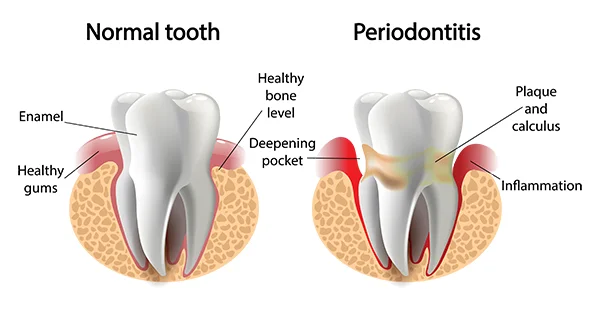Periodontal Care
Dentist McHenry, IL
 Periodontitis, commonly referred to as gum disease, starts off as gingivitis. This is a condition which occurs as the result of poor oral hygiene. Of course, there are other risk factors as well. For instance, smoking and tobacco use can drastically affect your oral health. Unfortunately, periodontitis is a chronic condition that requires ongoing treatment. That said, treatment at McHenry Smile Center is simple yet comprehensive. This includes scaling, root planing, pocket reduction surgery, tissue grafts, and tissue regeneration. In addition, we will also give you instructions for at-home care. Periodontitis, commonly referred to as gum disease, starts off as gingivitis. This is a condition which occurs as the result of poor oral hygiene. Of course, there are other risk factors as well. For instance, smoking and tobacco use can drastically affect your oral health. Unfortunately, periodontitis is a chronic condition that requires ongoing treatment. That said, treatment at McHenry Smile Center is simple yet comprehensive. This includes scaling, root planing, pocket reduction surgery, tissue grafts, and tissue regeneration. In addition, we will also give you instructions for at-home care.
Scaling and Root Planing
Scaling and root planing occurs once every three to four months. These procedures are comparable to routine cleanings, but they are deeper. Scaling refers to a process to remove plaque and tartar from the teeth and under the gumline. Root planing refers to the smoothing of tooth roots following the scaling procedure. This encourages the roots to reattach to the gums in order to restore your oral structure and prevent further infection.
Pocket Reduction Surgery
In the later stages of periodontitis, you will start to form bacteria pockets underneath your gum. Surgical intervention is sometimes necessary to clean out these pockets. We will use anesthesia to ensure your comfort during this procedure. Our dentist will fold loose gum tissue back to expose the infected area. Once the bacteria is cleared out, they will smooth the area to encourage reattachment, like with basic root planing.
Tissue Grafts and Regeneration
Periodontitis attacks both the gum and bone tissue in its advanced stages. When this occurs, we need to find a way to regenerate or replace the tissue. If left untreated, the surrounding tissue will continue to decay, leading to tooth loss. You will also experience changes in your oral structure, which makes oral hygiene and daily activities difficult.
We can provide both soft tissue and hard tissue grafts. There are several different types of grafts that we can use for each of these. We can discuss these more in-depth during your appointment. Soft tissue grafts include connective tissue grafts (subepithelial tissue), free gingival grafts (palate surface tissue), and pedicle grafts (healthy gum tissue). Bone grafts can come from outside donors, animals, or sites on your own body.
We also work with a number of regenerative procedures. These are often used in combination with grafts. These are a variety of substances and materials that encourage your body to naturally produce more of the missing tissue, soft or hard.
Self-Care
Our dentist may send you home with a round of antibiotics. It is critical that you finish the entire course in order to prevent further infection. We recommend using a fluoride-based toothpaste to brush your teeth twice a day. We also recommend flossing at least once a day. Antimicrobial mouthwashes can also be used to maintain oral hygiene.
Since your teeth will be sensitive following treatment, you may need to avoid hard or sticky foods as well as any tobacco. Also, try to avoid sugary foods and beverages as much as possible. For additional information on periodontal maintenance and care, call (815) 578-1000.
|